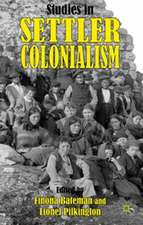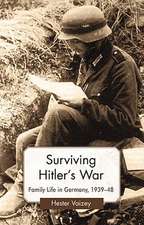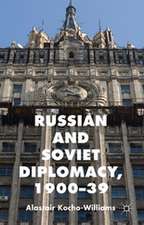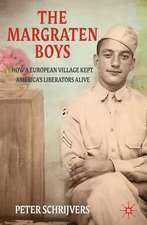Flemish Nationalism and the Great War: The Politics of Memory, Visual Culture and Commemoration
Autor K. Shelbyen Limba Engleză Hardback – 5 iun 2014
| Toate formatele și edițiile | Preț | Express |
|---|---|---|
| Paperback (1) | 386.99 lei 6-8 săpt. | |
| Palgrave Macmillan UK – 2014 | 386.99 lei 6-8 săpt. | |
| Hardback (1) | 394.87 lei 6-8 săpt. | |
| Palgrave Macmillan UK – 5 iun 2014 | 394.87 lei 6-8 săpt. |
Preț: 394.87 lei
Nou
Puncte Express: 592
Preț estimativ în valută:
75.57€ • 77.39$ • 62.86£
75.57€ • 77.39$ • 62.86£
Carte tipărită la comandă
Livrare economică 19 martie-02 aprilie
Preluare comenzi: 021 569.72.76
Specificații
ISBN-13: 9781137391711
ISBN-10: 1137391715
Pagini: 320
Ilustrații: XI, 320 p.
Dimensiuni: 140 x 216 x 25 mm
Greutate: 0.58 kg
Ediția:2014
Editura: Palgrave Macmillan UK
Colecția Palgrave Macmillan
Locul publicării:London, United Kingdom
ISBN-10: 1137391715
Pagini: 320
Ilustrații: XI, 320 p.
Dimensiuni: 140 x 216 x 25 mm
Greutate: 0.58 kg
Ediția:2014
Editura: Palgrave Macmillan UK
Colecția Palgrave Macmillan
Locul publicării:London, United Kingdom
Cuprins
1. Introduction 2. IJzerbedevaart: The Last Summer Pilgrimage to the IJzer 3. A Flemish Nation: Catholicism, Language and the Medieval Past 4. The Battle of the Golden Spurs: Enlistment Propaganda and The Front Movement 5. A Politicized Movement and the Memorialization of the Flemish Soldier 6. The IJzertoren: A Heldenhuldezerk for All of Flanders 7. World War I Memorial or Symbol of Freedom? Collaboration and the IJzertoren 8. IJzerbedevaart: The Pilgrimage to the IJzer 9. The IJzerwake: A Different Memory of the Great War 10. Transformation: The IJzertoren Memorial Museum to the Museum aan de IJzer 11. Conclusion
Notă biografică
Karen Shelby is Assistant Professor in the Department of Fine and Performing Arts at Baruch College, The City University of New York, USA. Shelby is an art historian specializing in visual culture and the Great War. Her areas of interest include the commemorative practices after the war, particularly for the Belgian Army, and historical representations of the war in the museums along the Western Front.








